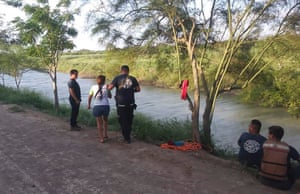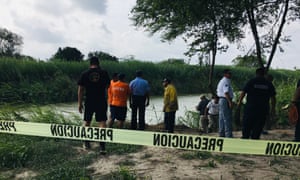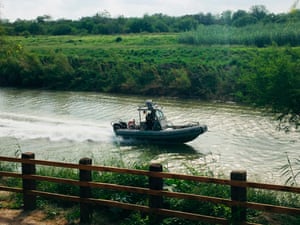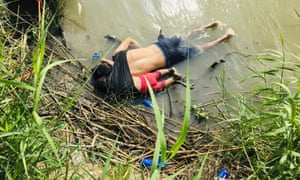The Guardian
Shocking photo of drowned father and daughter highlights migrants’ border peril
The toddler’s arm was still draped around her father’s neck after bodies were found in the Rio Grande as they sought asylum Warning: graphic images
The grim reality of the migration crisis unfolding on America’s southern border has been captured in photographs showing the lifeless bodies of a Salvadoran father and his daughter who drowned as they attempted to cross the Rio Grande into Texas.
The images, taken on Monday, show Óscar Alberto Martínez Ramírez, 26, and his daughter Valeria, lying face down in shallow water. The 23-month-old toddler’s arm is draped around her father’s neck, suggesting that she was clinging to him in her final moments.
The UN refugee agency compared the photograph to the 2015 image of the three-year-old Syrian boy Alan Kurdi who drowned off the Greek island of Kos – although it remains to be seen if it will have the same impact on America’s fierce immigration debate.
Their bodies were discovered on the bank of the river near Matamoros, Mexico, across from Brownsville, Texas, just half a mile (1km) from an international bridge.
According to Julia Le Duc, a reporter for La Jornada, Martínez Ramírez had arrived in Matamoros on Sunday, hoping to request asylum from US authorities with his wife, Vanessa Ávalos, and their daughter.
But when he realized that it could be weeks before they were even able to start the asylum process, Martínez decided they should swim across, said Le Duc, who witnessed Ávalos give her account to the police.
“He crossed first with the little girl and he left her on the American side. Then he turned back to get his wife, but the girl went into the water after him. When he went to save her, the current took them both,” Le Duc told the Guardian.

The image underlines the dangers which mostly Central American migrants face in their attempts to escape violence, corruption and poverty at home and find asylum in the United States.
As part of a broader crack down on migration, the Trump administration tightened the country’s asylum system, creating a growing backlog of cases. Migrants are routinely forced to wait for months to start the asylum process; those who despair of waiting turn to more remote and dangerous routes across the southern frontier.
On Sunday, two babies, a toddler and a woman were found dead after succumbing to heat exhaustion in Anzalduas Park, which borders the river in the city of Mission.
Elsewhere three children and a woman from Honduras died in April after their raft capsized on the Rio Grande, and a six-year-old from India was found dead earlier this month in Arizona, where temperatures routinely soar well above 100F.
So far this year, dozens of people have died attempting to cross the Rio Grande, where water levels are at their highest levels in 20 years and record levels of snow-melt run-off have transformed the river into a raging torrent.
Claudia Hernández, a Mexican police officer in the border town of Piedras Negras, told the Guardian: “The river is treacherous and the people who aren’t from here don’t know that. I grew up here along the Río Bravo river [Río Grande]. I wouldn’t even go into that water to bathe or swim. There are springs and whirlpools and when the current takes you it can pull you under.”

Isabel Turcios, a Franciscan nun, the director of the Casa del Migrante shelter in Piedras Negras said that local activists warn migrants not to try their luck on the river, but the US has drastically reduced the number of migrants who are allowed to request asylum each day.
“People get desperate and cannot keep waiting. They just want to cross. So they go to the river and without any form of protection – no life jacket, nothing to save them – they go into the river. They always tell me that if God wants them to make it then somehow they will make it.”
She added: “It’s not how things should be. They should be able to cross at the bridges. Every human being has the right to migrate. It’s a human right.”
Meanwhile Mexico has launched its own crackdown on migrants as the government scrambles to ward off Trump’s threat of trade tariffs.
“Very regrettable that this would happen,” said President Andrés Manuel López Obrador on Tuesday in response to a question about the latest deaths on the border. “As there is more rejection in the United States, there are people who lose their lives in the desert or crossing” the river.
According to reports in the local press, Martínez, Ávalos and their daughter left their home in the municipality of San Martín in April. But after two months waiting in the southern city of Tapachula – and fearful of the Mexican authorities – the family decided to push on.

“They said they were scared because of the way things were going for migrants, what with the pressure from Trump. That’s why they decided to cross the river. Their plan was to hand themselves into US migration,” Martínez’s sister Wendy told El Diario de Hoy.
One of Martínez’s cousins, Enrique Gómez, tweeted an appeal to the Salvadoran president, Nayib Bukele, pleading for help in repatriating the bodies. Gómez said the family sought assistance from the Salvadoran government but were being charged between $7,000 and $8,000 to repatriate the bodies. Bukele’s office responded by asking Gómez to send a private message and promised to start the repatriations.
On Wednesday, Pope Francis expressed “immense sadness” over the fate of Martínez and his daughter. “The pope is profoundly saddened by their death, and is praying for them and for all migrants who have lost their lives while seeking to flee war and misery,” a spokesman said in a statement.
The UN high commissioner for refugees, Filippo Grandi, said the deaths represent “a failure to address the violence and desperation pushing people to take journeys of danger for the prospect of a life in safety and dignity.”
In the US, several Democratic presidential candidates, including Kamala Harris, Beto O’Rourke and Cory Booker, also expressed their dismay on Tuesday evening. “Trump is responsible for these deaths,” wrote O’Rourke in a tweet, while Harris called it “a stain on our moral conscience”.
The photograph of Martínez and his daughter provoked soul-searching among some Mexicans, but recent polls revealed that attitudes towards migrants have hardened in recent months.
“The image… is a painful symptom of our systematic failure,” tweeted author Alma Delia Murillo. “And on top of that you have idiots who blame the migrants.”
Polling firm Parametría showed 58% of Mexicans oppose migrants entering the country from Central America. 32% of respondents expressed the same opinion on November, when migrant caravans were welcomed with outpourings of generosity.
This report includes material from the Associated Press

